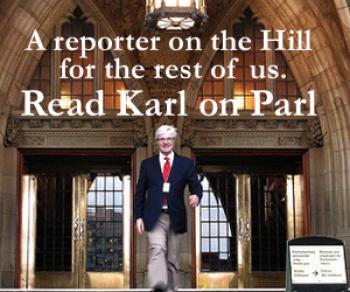The House got back to work on Monday and the Government found itself challenged all at once by First Nations, refugees, people who get Employment Insurance (EI), and — yes — those well-entitled Senators.
To start with, the EI story.
Mainstream media outlets in Canada are not in the habit of calling ministers of the crown liars.
But that’s what Montreal’s Le Devoir did on Monday.
It said Human Resources Minister Diane Finley had lied when she told Parliament that Employment Insurance inspectors did not have quotas, somewhat like traffic cops.
The Minister had said that there was a departmental target but that individual inspectors did not have to recover a certain amount of money supposedly collected fraudulently as Employment Insurance payments.
Le Devoir got its hands on the form used to evaluate the civil servants who do the inspections.
That form says, in black and white, that the civil servants must recover $485,000 per year. That is one of their job requirements, as it were, one of the “deliverables” they are expected to deliver.
Finley’s explanation was that these were not “quotas”; they were “targets.” She did not define the difference.
When Official Opposition Leader Tom Mulcair raised this in the House, Finley repeated that argument about targets rather than quotas and then said, without substantiating evidence, that “last year the employment insurance program lost hundreds of millions of dollars due to fraud and ineligible payments, and that despite nearly half a billion dollars of ineligible payments that were detected and stopped by Service Canada.”
The government has not released any information about those unaccounted for “hundreds of millions of dollars.”
Speaking to reporters after Question Period, Mulcair focused on Finley’s semantic legerdemain with the words “targets” and “quotas.”
It is, the NDP leader said, “the art of the half lie.”
“She’s playing on words,” Mulcair scoffed, “It’s not true that there were no quotas. Of course there were quotas. They were presuming that people were guilty. And the problem is you’re not even going after people who are presumed to have committed a fault … You’re going into people’s homes to try to take away something that they’ve paid into and that they have a right to.”
The reason for the Conservatives’ zeal to recover EI payments, the Mulcair argued, is that they and the Liberals who preceded them “illegally emptied out the employment insurance account that had been paid into by every employer and every employee in Canada, using it for general purposes to create the fiscal space to give tax reductions, mostly to the richest corporations.”
The Opposition contrasted the mean-spiritedness toward EI recipients with the government’s rather more generous attitude toward Senators and their travel expenses.
There is a Senate Committee looking into all that now, but, as befits that archaic, oligarchic institution, it is being done in a “gentlemanly” fashion, quietly and out of public view.
Appealing to the Conservative voters’ resentment
The need to scapegoat groups of vulnerable people seems to be almost in the DNA of the current Conservatives in Ottawa.
They believe it is good politics because they are not “broadcasting” to all of Canada; they are “narrowcasting” to a targeted population segment.
The political calculation is that the 33 per cent to 38 per cent of the voters the Conservatives will need to win another majority — given a severely fragmented opposition — are motivated by resentment toward the undeserving poor, welfare cheats and “bogus” refugees who want to take advantage of Canada’s generosity.
Some of those “bogus” refugees are now taking the government to court over the elimination of health benefits. In this effort, they are supported by a group of doctors, organized under the banner of Canadian Doctors for Refugee Care and the Canadian Association of Refugee Lawyers.
They are going to the Federal Court, with a four pronged legal argument.
They say the cuts are against section 7 of Canada’s Charter of Rights and Freedoms, which guarantees life and the security of the person.
The cuts, they argue, are cruel and unusual punishment, which is contrary to section 12 of the Charter.
The cuts are also contrary to the equal protection provision of the Charter, section 15. They are discriminatory because they distinguish between immigrants and refugees based on country of origin.
And finally, they say that the cuts are contrary to Canada’s international obligations, under the Convention of the Rights of the Child and the Convention on Refugees.
All in a day’s work
Refugee health is not the only case in which current government policy is being litigated.
A group representing Aboriginal children, headed by Cindy Blackstock, started making its case in Monday — after years of delay — that the federal government underfunds child welfare programs on reserves, forcing an unconscionable number of First Nations children into foster care off reserve.
Not to mention the First Nations Leaders from Quebec who are expressing alarm at the potential damage of federal cuts to policing services in First Nations communities.
It’s all in day’s work for the Harper folks.
None of it, sadly, is likely to overly concern the only Canadians they care about: the notionally “middle class,” hardworking, suburban, “mainstream” base.




